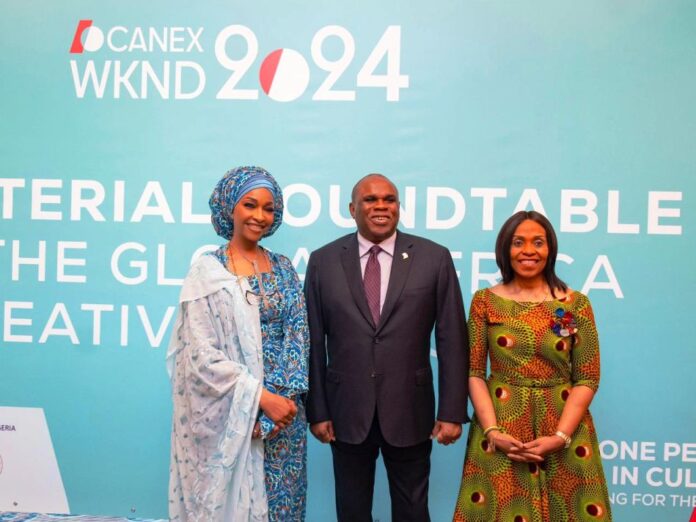
The Minister of Art, Culture, and Creative Economy Barrister Hannatu Musa Musawa has emphasized the need to empower Africa’s fashion and textile ecosystem.
In a keynote address delivered on Thursday at the Creative Africa Nexus Weekend Sumit in Algiers, the Minister highlighted Africa’s rich textile heritage, citing iconic fabrics such as Adire, Kente, Bogolan, and Ankara, which embody the history, identity, and pride of African people.
“Despite this heritage, it is deeply ironic that many of the fabrics we cherish, such as Ankara, are predominantly produced outside Africa. Nearly 90% of the Ankara consumed on our continent is imported, leading to an annual loss of approximately $3 billion to foreign manufacturers. We must change this. We must reclaim our fashion narrative by strengthening local production capacities and ensuring that the benefits of this vibrant industry remain within our borders”.
Minister Musawa emphasized the immense economic opportunity in Africa’s fashion industry, projected to grow to $15.5 billion by 2025, stressing the need to address structural challenges hindering local production through collective action, including establishing cooperatives that foster collaboration.
“Fashion is far more than a form of expression. It is an economic powerhouse. The global fashion industry is valued at approximately $2.5 trillion. In Nigeria alone, the fashion industry contributes approximately $6.1 billion to GDP, while South Africa’s textile sector employs over 140,000 people, demonstrating the sector’s capacity for job creation.
“Investments in fashion will create millions of jobs, particularly for women and youth. By expanding local production, we will not only add value within our borders but also position Africa as a global hub for fashion.
We are also working diligently to protect and promote our fashion, garment, and textile industries by updating our intellectual property (IP) laws. These laws will protect our traditional techniques, textiles, and designs while simultaneously ensuring that we address the exploitation of our cultural treasures. This will prevent the originating communities from remaining unacknowledged and impoverished while others profit from their creativity.”
The Design Nexus and Destination 2030 initiatives, under Minister Musawa’s leadership, will establish manufacturing hubs and luxury craftsmanship training programs across Africa which align with Nigeria’s vision to position its arts, culture, and creative economy at the forefront globally.
The session also featured a panel of discussants including Dr. Pamela Samasuwo-Nyawiri, Co-founder & Creative Director, Vanhu Vamwe from Zimbabwe, Santosh Kumar, Director of Legislation, International Cooperative Alliance from Belgium, Kenza Fourati, Co-Founder & President, OSAY the label from Tunisia, Khanyi Mashimbye from Afreximbank, Lily Sommer, Programme Manager – AfCFTA, International Trade Centre and Adel Kadar, Head, Weaving Production, TAYAL from Algeria.
NNEKA IKEM ANIBEZE Ph.D
SA MEDIA & PUBLICITY





